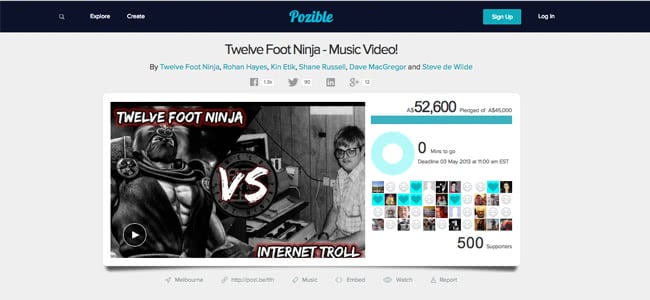Crowdfunding has taken the world by storm, in particular in the fields of technology and music.
The Australian crowdfunding record for a music project was smashed earlier this week when music charity Support Act raised nearly $150,000, and bands are increasingly looking to crowdfunding as a new revenue opportunity to support their album releases, and touring.
[include_post id=”420086″]
But the Australian Tax Office has been watching these developments closely, and it now wants a piece of the action. How much? 10% to be precise. Which could result in some rather large tax bills for a number of Australian musicians.
Like Ne Obliviscaris, who earlier this year raised a staggering $63,177, or Eskimo Joe who raised $60,736 towards the production and release of their latest studio album.
And it’s not just limited to musicians. Melbourne venue Cherry Bar also used crowd funding earlier this year to assist with sound proofing to protect against the venue’s new neighbours, with concerned fans giving more than $50,000 in 24 hours.
So why does the tax office want a piece of the action? Because they’ve decided that if you provide something of value in return for “donations” you should be paying GST on those “donations”.
[include_post id=”419986″]
“In general terms, GST is only payable by an entity where it is GST registered or required to be, and it supplies something of value in return for a ‘donation’ from a contributor in Australia,” the ATO advised Parliament in Canberra earlier this week as SMH reports.
“However, no GST should be payable by the entity where a contributor gets an equity or debt interest in return for the contribution.”
Shadow Assistant Treasurer Dr Andrew Leigh said that the ATO’s brief statement indicated that it was still in the early stage of examining the GST implications for crowdfunding.
[include_post id=”417339″]
“I’d be concerned if GST treatment hampered crowdfunding and I would certainly like to see the ATO develop its thinking on the issue,” Dr Leigh said.
“I think it’s important because whenever there is uncertainty investors are going to go elsewhere. There are plenty of other things that people can be throwing their money in.”
So what impact will this have on crowdfunding for musicians? It remains to be seen. In the meantime, it’s probably wise for bands that have successfully raised money using services like Kickstarter or Pozible, to not spend it all at once.

































